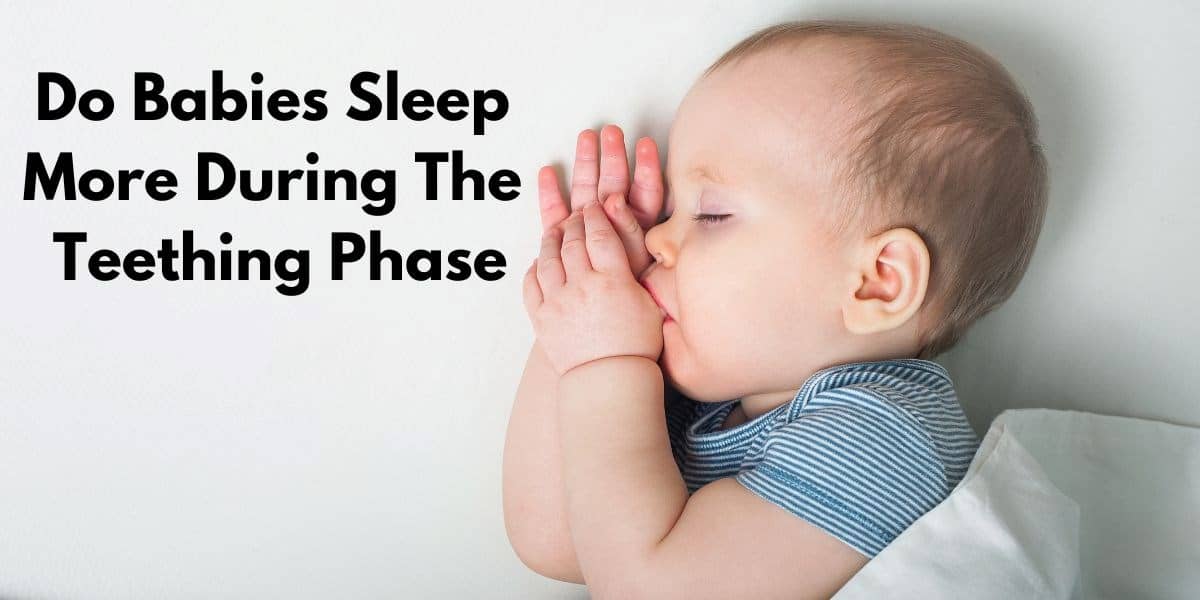Are you a tired parent wondering about babies sleep more when teething? Well, you’re in luck! In this article, we will explore the common question of whether babies sleep more during this stage.
We will provide you with three frequently asked questions about teething and sleep, all while maintaining a friendly and informative tone. So, grab a cup of coffee and get ready to uncover the truth about your little one’s sleep habits during the teething phase!
What is teething?
Teething refers to the process in which an infant’s primary teeth, also known as baby teeth or milk teeth, emerge through the gums. This milestone typically occurs during the first year of a baby’s life, with the lower front teeth usually appearing first. The teething process can cause discomfort and irritability in babies, leading to changes in their sleep patterns.
Teething process
The teething process involves the gradual eruption of teeth through the gums. This begins when the tooth starts to move beneath the surface of the gums, leading to inflammation and pressure on the surrounding tissues. Eventually, the tooth breaks through the gumline, providing relief for the baby.
Symptoms of teething
Some common symptoms of teething include excessive drooling, increased chewing on objects, swollen gums, irritability, and low-grade fever. Babies may also develop a rash around the mouth area due to excessive drooling. These signs can vary from baby to baby, with some experiencing fewer or more pronounced symptoms.
Typical age of teething
Although the timing can vary, most babies start teething around the age of six to eight months. However, some infants may begin teething as early as three months, while others may not experience their first tooth until after their first birthday. It is important to remember that each baby develops at their own pace, and variations within this time frame are considered normal.

Sleep patterns in babies
Understanding the sleep patterns of babies is essential in exploring the relationship between teething and sleep disruptions. Sleep is crucial for a baby’s growth, development, and overall well-being.
Newborn sleep patterns
Newborns typically sleep for most of the day, with periods of wakefulness interspersed throughout. They have shorter sleep cycles, usually lasting about two to three hours at a time. These cycles may consist of brief periods of deep sleep followed by lighter, more active sleep.
Evolution of sleep patterns in infants
As babies grow, their sleep patterns evolve. They tend to sleep for longer stretches at night and have more consolidated sleep. Naps during the day become more structured, and babies may settle into a more predictable sleep routine.
Factors influencing baby’s sleep
Various factors can impact a baby’s sleep patterns, including hunger, discomfort, temperature, noise, and the environment. Understanding these factors can help caregivers create a conducive sleep environment for their baby.
Also Check: When Do Babies Recognize Their Names?
Relationship between teething and sleep
While there is a commonly held belief that teething can disrupt a baby’s sleep, it is important to examine the scientific evidence regarding this relationship.
Common belief
Many parents believe that teething causes their baby to sleep more due to increased fatigue. They may observe changes in their baby’s behavior and sleep patterns during the teething phase.
Scientific evidence
Scientific studies exploring the impact of teething on sleep have produced mixed results. Some studies suggest that teething may cause mild sleep disturbances, such as more frequent night awakenings or restlessness. However, other studies have found no significant association between teething and sleep disruptions.
Variations in sleep during teething
It is important to note that each baby may respond differently to teething. While some infants may experience sleep disturbances, others may remain unaffected. Factors such as the severity of teething symptoms, individual pain thresholds, and coping mechanisms can contribute to variations in sleep patterns during the teething phase.
Impact of teething on sleep quality
Teething can have several effects on a baby’s sleep quality, potentially leading to disrupted sleep and changes in sleep duration.
Disrupted sleep
During teething, discomfort and pain in the gums can cause babies to wake up more frequently during the night. This disrupted sleep can lead to increased restlessness and difficulty in falling back asleep.
Sleep duration changes
Teething may also impact the overall duration of a baby’s sleep. Some infants may experience shorter sleep cycles or find it challenging to settle into a deep sleep due to gum irritation. Consequently, they may wake up earlier than usual or have difficulty extending their daytime naps.
Effect on nap schedules
Teething discomfort can interfere with a baby’s ability to nap peacefully. Babies may find it challenging to relax and fall asleep due to gum sensitivity and the associated discomfort. Consequently, their nap schedules may become irregular or shorter in duration.
Factors contributing to increased sleep during teething
While teething has the potential to disrupt sleep, certain factors can contribute to increased sleep during this phase.
Pain relief
Teething rings and other teething toys can provide relief to babies by counteracting the gum pressure and offering a soothing sensation. When babies experience pain relief, they may find it easier to relax and fall asleep, leading to increased sleep during teething.
Release of soothing chemicals
The natural process of teething triggers the release of endorphins and other soothing chemicals in the baby’s body. These chemicals can have a calming effect, promoting better sleep quality during the teething phase.
Fatigue from discomfort
The discomfort and irritability associated with teething can make babies more fatigued. As a result, they may sleep for longer stretches during the day and find it easier to settle into sleep at night.
Common sleep disturbances during teething
Teething can manifest in various sleep disturbances, affecting both the duration and quality of a baby’s sleep.
Night awakenings
Babies may experience more frequent night awakenings due to teething discomfort. They may wake up crying or fussing and require soothing or pain relief to fall back asleep. This can lead to sleep disruptions for both the baby and their caregivers.
Restless sleep
Teething-related discomfort can cause babies to have restless sleep. They may toss and turn more, change positions frequently, or exhibit increased agitation during sleep. This restlessness can result in fragmented sleep and decreased sleep quality.
Increased crying
The pain and discomfort of teething can cause babies to cry more frequently, especially during the night. This increased crying can disrupt their sleep patterns and make it challenging for them to settle back to sleep.
Strategies for managing sleep disruptions
Parents can employ various strategies to help manage sleep disruptions during teething and promote better sleep for their babies.
Provide teething relief
Offering teething toys, cold washcloths, or chilled teething rings can provide relief to babies by numbing their gums and reducing inflammation. This can help alleviate teething discomfort and improve sleep quality.
Maintain regular sleep routine
Establishing and maintaining a consistent sleep routine can help babies feel more secure and relaxed during the teething phase. Consistency in bedtime rituals and nap schedules can signal to the baby that it is time to wind down and prepare for sleep.
Individualized approach
Every baby is unique, and what works for one may not work for another. Parents should be open to adapting their strategies and finding individualized approaches that suit their baby’s needs. Experimenting with different soothing techniques and observing the baby’s response can help identify effective methods for managing sleep disruptions during teething.
Seeking professional advice
If sleep disruptions during teething become persistent or significantly impact a baby’s overall well-being, it is advisable to seek professional advice from a pediatrician.
Consult pediatrician
A pediatrician can offer guidance and support in managing sleep disruptions during teething. They can assess the baby’s overall health, provide recommendations for pain relief options, and address any concerns or questions regarding sleep patterns.
Consider alternative causes
While teething is a common milestone, it is important to consider alternative causes for sleep disturbances. Other factors, such as illness, developmental changes, or environmental factors, may contribute to sleep disruptions. Consulting a healthcare professional can help rule out other potential causes and provide appropriate interventions.
Addressing sleep concerns
Pediatricians can provide strategies for addressing specific sleep concerns during teething. They may recommend temporary adjustments to sleep routines, introduce pain management techniques, or suggest alternative soothing methods based on the baby’s individual needs.

Source: TheTechBrain AI
Parents’ experiences and anecdotes
Parents often share their experiences and strategies for managing sleep disruptions during the teething phase.
Mixed experiences
The experiences of parents regarding the impact of teething on sleep can vary widely. While some parents report significant sleep disruptions, others may observe minimal changes in their baby’s sleep patterns during teething.
Coping strategies from parents
Parents may try different strategies to help soothe their teething baby and promote better sleep. These strategies can include using teething gels or medications, offering chilled foods or teething biscuits, or using natural remedies such as chamomile tea or herbal supplements.
Sharing common challenges
Parents often find solace in sharing their challenges and connecting with others going through a similar experience. Online forums, support groups, or parenting communities can provide valuable support, advice, and empathy during the teething phase.
Conclusion
Teething is a natural process that can have an impact on a baby’s sleep patterns. While there is no definitive scientific consensus on the extent of this impact, many parents observe changes in their baby’s sleep during teething.
Understanding the symptoms, individual variations, and potential strategies for managing sleep disruptions can help parents navigate this phase with greater ease. Seeking professional advice when needed and connecting with other parents can provide additional support during this challenging but temporary period of a baby’s development.
